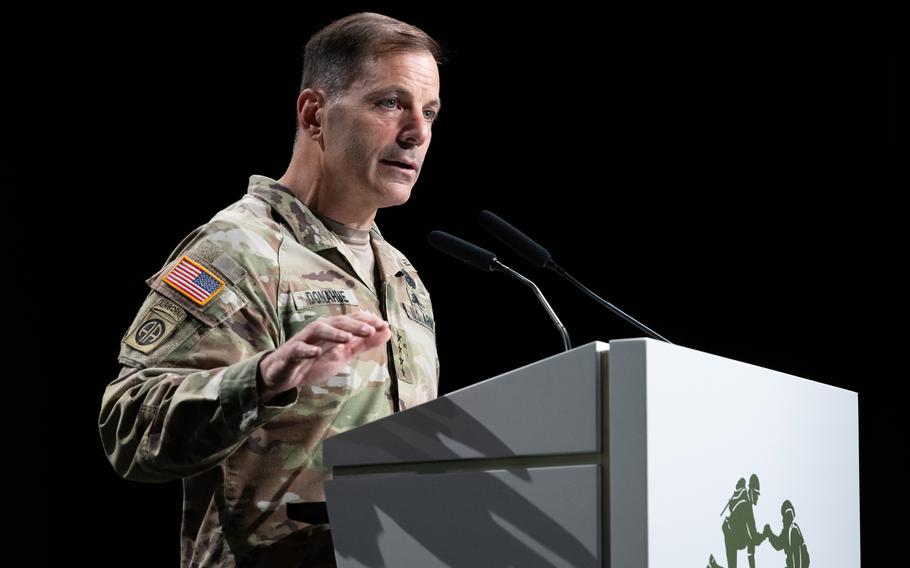
U.S. Army Europe and Africa Commander Gen. Christopher Donahue speaks in Wiesbaden, Germany, on July 16, 2025, at LandEuro, an international symposium dedicated to ground forces in Europe. (Phillip Walter Wellman/Stars and Stripes)
WIESBADEN, Germany — The Army’s top commander in Europe delivered a challenge Wednesday to arms manufacturers, telling a gathering of defense industry insiders that he wants a universal rocket launcher so allies can fight as one.
Gen. Christopher Donahue, head of U.S. Army Europe and Africa, highlighted the need for a common launcher as emblematic of a larger challenge.
“It’s trust,” Donahue said. “That’s all that is. We can solve it.”
For decades, U.S. commanders in Europe have lamented a defense industrial approach that doesn’t ensure that different weapons used by NATO countries can work together.
Speaking at a convention hosted by his command in Wiesbaden and the Association of the U.S. Army, Donahue said solving the conundrum that’s vexed military commanders for years needs to be front and center.
At the top of Donahue’s list are a launcher with offensive and defensive capability and a common fire control system that any ally can use.
Currently, many nations buy systems that are incompatible with those of other allies because of differing specifications, competing commercial interests and quirks in the procurement process.
But Donahue said the priority now needs to be on finding an alliance-wide defense industrial breakthrough that enables any ally “to take munitions from any country and shoot through them.”

Retired Army Gen. Robert Brown, president and CEO of the Association of the U.S. Army, speaks at LandEuro in Wiesbaden, Germany, July 16, 2025. (Phillip Walter Wellman/Stars and Stripes )
At the RheinMain Conference Center in Wiesbaden, scores of weapons-makers mingled with U.S. and allied defense officials.
Representatives of Ukraine also attended the two-day event, dubbed LandEuro, which was expected to examine lessons learned from the ongoing Russia-Ukraine war.
Shon Manasco, senior counselor at software producer Palantir Technologies and former acting undersecretary of the Air Force, said that when it comes to strengthening NATO’s arsenal, allies should consider that simple sometimes beats fancy.
“Russians are producing munitions so fast that we can’t even count them,” Manasco said during a panel discussion. “So sometimes for me it feels like we’re driving a Ferrari into a demolition derby.”
“Pretty weapons don’t win wars,” he added. “Lots of ugly ones do.”
The meeting comes during a time of high tension in Europe, where allies have been busy rebuilding their militaries over the past several years to deal with the threat posed by Russia.
Donahue and others speaking during the gathering talked up the need for a global approach to countering hostile adversaries.
The notion of “global deterrence” is being hotly debated in defense circles, with talk of what U.S. military priorities are and whether focusing more on countering China in the Pacific should come at the cost of the American military mission in Europe.
John Nagl, a U.S. Army War College professor speaking at the event in Wiesbaden, said there are linkages between deterring China in the Pacific and Russia in Europe.
“This is in fact the most important land theater in the world,” Nagl said of Europe. “It has been for centuries. It will, I believe, continue to be.”
Administration officials such as Elbridge Colby, the undersecretary of defense for policy, have been vocal about the need to rebalance more forces to the Pacific. That could eventually have implications for the U.S. force posture in Europe.
Nagl said that China is “a challenge right now and not a threat.”
“It doesn’t have to turn into a threat if we do the right things against our acute threats, which right now are Iran and Russia,” he added.
Donahue said the concept of global deterrence also applies to how weapons are made.
“How do you build (weapons) to a standard that you can actually fight with it throughout an alliance?” Donahue said. “But just as important, because this is global, how do you use it in the Middle East? How do you use it in the Pacific?”
For NATO, a new agreement that calls for member countries to spend 5% of gross domestic product on defense in the years ahead could serve as a windfall that will give industry a jolt.
Alan Meltzer, the top U.S. diplomat in Germany, said American and European partners will need to coordinate to ensure that funds are put to effective use.
“We must begin by reforming procurement laws and cutting red tape at the EU level,” said Meltzer, the charge d’affaires at the U.S. Embassy in Berlin. “And of course in Germany, that will enable both U.S. and European defense companies to access the German market.”
Stars and Stripes’ Phillip Walter Wellman contributed to this report.